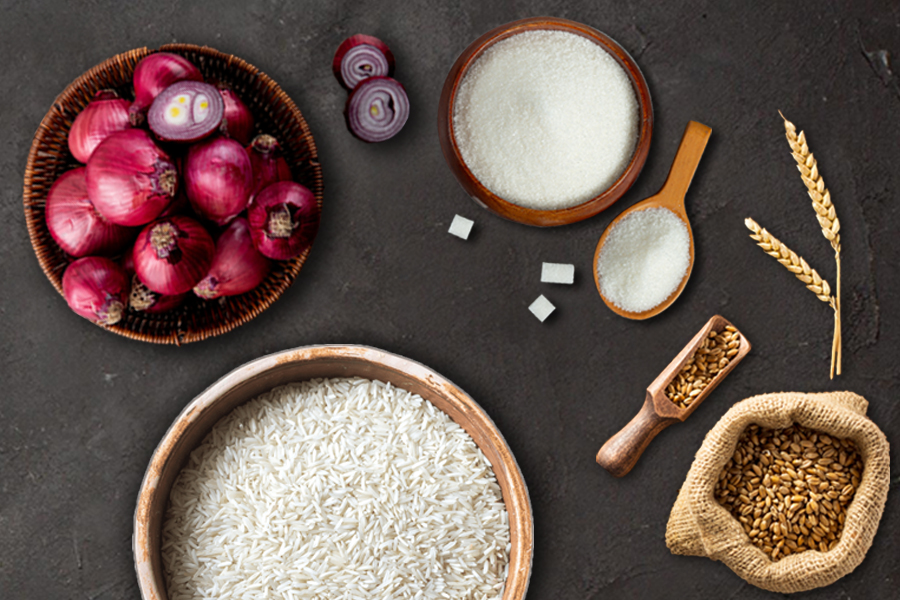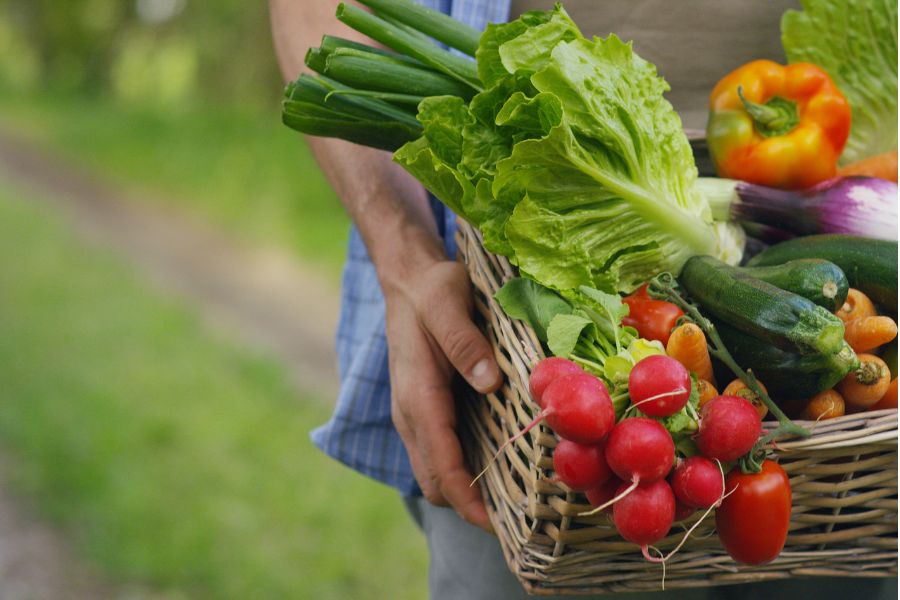Electronic trading of farm produce could take off in a big way
Prof. Kushankur Dey, Chairman of the Centre for Food & Agri-Business Management of the Indian Institute of Management, Lucknow, feels that institutionalising of electronic trading and transaction of farm produce is a welcome move. The electronic National Agriculture Market (eNAM) should play a pivotal role in price recovery and provide real-time spot prices to farmers organizations, through a demutualized trading system.

IBT: What is your view on how the three farm bills – “The Farmers Produce Trade and Commerce (Promotion and Facilitation) Ordinance, 2020” “The Essential Commodities (Amendment) Ordinance, 2020”, and The Farmers (Empowerment and Protection) Agreement on Price Assurance and Farm Services Ordinance, 2020 will impact the Indian agriculture sector?
Prof. Kushankur Dey: The Farmers’ Produce Trade and Commerce (Promotion & Facilitation) Act, 2020 is a modification over the Agricultural Produce Livestock Marketing (Promotion and Facilitation) Act, 2017. It is a fact that more than 85% of our population belongs to and marginal category, having operational landholdings less than 1-2 hectares. This Act is yet to chalk out the modalities or nuances on how the Act will be executed by concerned states and how small and marginal farmers will avail the benefits?
Nevertheless, Farmer Producer Company, a legal entity of farmer producer organisations incorporated in Section 465(1) of India’s Companies Act, 1956, can take advantage. Here electronic trading and transaction platforms can play a big role if farmers and aggregators use this channel. However, we need not be too optimistic, since smallholder farmers are in the clutches of middlemen or traders who provide the inputs, credit, and bear unforeseen or pecuniary expenses of farm households. This interlocking arrangement is ostensibly difficult to overcome, unless the agri-marketing system undergoes a sea change. This Act might effectuate just that.
Coming to the Essential Commodities (Amendment) Act, 2020, I have some reservations. While it will improve the stock holding limit by traders, corporates and resource-rich farmers, the amended Act may create an artificial scarcity in supply, which will escalate prices, unless the price pooling mechanism is put in place. This will create the need for state intervention and hurt capacity of poor consumers to pay for these products.
The Farmers (Empowerment and Protection) Agreement on Price Assurance and Farm Services Act, 2020 is inspired by Agricultural Produce Livestock Contract Farming Services (Promotion and Facilitation) Act, 2018. Contract farming has a chequered history in India. Small holder farmers will not be able to avail this benefit, though farmer producer companies, meeting the economies of scale, can enter into a written agreement with prospective buyers for guaranteed prices. However, the model farming agreement should be issued by the central government to the states, so that contract governance and management would be legally binding and the scope of breaching the contract could be minimized.
It will create demand for high value commodities with great export prospects and command high value realization. However, there is a possibility that the private oligopsony may end up forcing small and marginal farmers to accept poorer terms for their produce, especially for the contract purview. To avoid this situation, there should be a tripartite agreement between farmer, contract firms, and the concerned state government.
Also, given the political economy of contract farming, concerned states should enforce safeguarding mechanism for their farmers such as fair or guaranteed price, terms of payment to farmers, mechanism of disputes resolution through conciliation and grievance redressal. The promulgated Act clearly mentioned these and seems an improvisation of the former APLCFS (P&M) Act, 2018.
The farm reform Acts do raise important questions. Will these reform be a boon for more than 85% farm holders and ensure a doubling of their income? Will the liberal outlook of the newly introduced farm Acts be a saviour for agrarian prices? Do we need to have a critical assessment of National Agriculture Policy framework and related administrative policy reform after 2014-15 to address some of these issues?
IBT: Some political parties and analysts have cautioned that the farm bills would lead to massive corporatisation and be inimical to the interests of farmers. What is your perspective on these concerns?
Prof. Kushankur Dey: I want to throw some light on trade practices. The Essential Commodities (Amendment) Act, 2020 can further intensify the spirit of cartelisation and induce collusive trade practices. Traders and MNCs may hoard more when prices are low and dispose when the prices are high and eventually, this can drive a food price inflation spiral.
Institutionalizing electronic form of agricultural produce is a welcome move. The electronic National Agriculture Market (eNAM) has been in existence since early 2016. As of now, about 1.7 crore farmers, roughly 11% of the total farm population, have registered on eNAM. More than 80 lakh members have benefited from the platform, either materially or non-materially through price realization or price reference point. Now, eNAM should play a pivotal role in price recovery and provide real-time spot prices to farmers organizations, through a demutualized trading system. However, a state wise distribution of farmer organization participation on eNAM is yet to be documented.
It would be interesting to explore. Can the electronic trading and transaction platform, which is a thrust area of the Farmers’ Produce Trade and Commerce (Promotion and Facilitation) Act, 2020, emerge as an alternative selling medium for farmer collectives? Does the government want to roll out a different model or revamp the existing eNAM integrated APMCs? In other words, rationalization of such a decision calls for designing of modalities and developing a comprehensive evaluation framework.
IBT: A major fear being cited is the possible removal of the MSP regime? How have the MSP provisions fared for farmers over the years? Do you think the same support is sustainable and viable in future as well? Why or why not?
Prof. Kushankur Dey: Participation of smallholders in the MSP regime is abysmally low. The 70th NSSO Round shows that about 5.8% of the farm population avails the benefits of the MSP regime. Farmers are assured of getting a fixed payoff through MSP. For example, in Uttar Pradesh, you will find that participation of farmers in MSP is hardly 3.05%.
UP has about 2.77 crore of farm population as per the Socio-Economic Caste Census of 2010-11. Now, only 7.8 lakh farmers participated last year in 2019-20. One reason for this is that most of the farmers are neither aware nor able to access the MSP. Also, it is difficult for a poor farmer to arrange transport facilities, going to the mandi, getting a suitable date for procurement, and so forth. We have observed in the APMCs of western and eastern parts of Uttar Pradesh that instead of approaching the procurement agency, they sell at a throwaway price to the trader.
In the Kharif Marketing Season of 2019–20, the prevailing price of FAQ Grade-A paddy was Rs. 18,350 a ton or Rs. 1,835 a quintal, whereas FAQ Common Variety was sold at Rs 1,815 a quintal besides the Rs 20 a quintal incidental paid to farmers. However, smallholders sold their paddy below the MSP at APMCs, because they needed immediate cash. And after harvesting, they do not have dryer/moisture meter to reduce moisture level to 15-16% or test moisture content. Hence, selling to traders by bypassing the procurement agencies at APMCs is a common practice in Uttar Pradesh.
On the other hand, only large farmers or resource rich farmers can avail these benefits. You can see that farmer producer companies are not participating in the procurement operation, and they are not able to sell their member produce to the procurement agencies as of now in Uttar Pradesh. The plausible reasons would be aggregation, transportation, remoteness, or the distance between the farmgate and the mandi.
So, there are several structural and operational bottlenecks in the MSP system. I am not sure if there is any causal linkage between these Acts and gradual phasing out of MSP regime. Hopefully, these 2 systems can coexist for some time, but ultimately this MSP regime would be phased out gradually and electronic trading and transaction platform would be operational in a big way.
IBT: Given that the majority of Indian farmers have marginal land, how will they be able to ensure quality produce in bulk as required by companies they sign contracts with? Will farmers have the necessary bargaining power? What are the challenges they could face vis-à-vis contract farming?
Prof. Kushankur Dey: There are several instances when farmers show opportunistic behaviour and some instances when corporate buyers show opportunistic behaviour. Now for small and marginal farmers, it is a question of making agriculture a profitable enterprise. So, in no way, will they be able to participate in contract farming, unless farmer producer organizations grade their member produce, pool them, and supply to contract firms at a guaranteed price. Contract farming may be lucrative for farmers who cultivate high value commodities and those processors or modern retail chains, which often face transaction uncertainty or incur search costs, monitoring costs, and negotiation costs for asset-specific investment.
IBT: One of the key criticisms against the Essential Commodities (Amendment) Bill, 2020 is that the stock limits for “extraordinary circumstances” are dependent on the agmarknet prices and the conditions of 100% increase in retail prices for perishables and 50% increase for non-perishables are likely to be breached frequently. How can this be prevented to ensure that frequent stock limits are not imposed?
Prof. Kushankur Dey: For essential commodities, State Food and Civil Supplies Corporations play an important role. Now, we need to understand the whole supply chain for essential commodities. How is the FCI procuring? How are the FCI and State Civil Supplies Corporation distributing food through public distribution system? Then how does it go to a fair price shop and get distributed to consumers? Now, for rice and wheat, the excessive stock holding limit should not be breached, as it will create an artificial supply-demand dispatch. Local demand will escalate and there will be staggered supply, and stock owners will release the commodities when market prices are high. Food controller or Food inspector should inspect the inventory at the dealer’s godowns at periodic intervals. The local price movement should be checked.
IBT: What should the central and state governments do further to ensure that farmers, particularly small farmers, can benefit from the enhanced market opportunities and freedom of food stocking?
Prof. Kushankur Dey: We need to study the state-wise performance of the electronic national agricultural market. This performance assessment can help justify the decision for this warehouse receipt-based electronic trading and transaction defanging the APMCs. So, this is positive not only in view of this pandemic but also due to poor uptake of APMCs.
We need to consider the legal implications of the new Acts. So, as per section 4A of the APLMA Act, it is mentioned that warehouses accredited by Warehouses Development and Regulatory Authorities can offer trading services once the concerned state notifies the warehouses at the market and includes national negotiable warehouse receipt. So, it can greatly benefit farmer producer companies and their members.
Farmer producer organizations for benefitting the smallholders can be allowed to participate in a great way because their mandi sales tax will be waived off. Section 19 of the APLMA Act gives autonomy to the farmers and market infrastructure institutions which is by and large amplified in the Farmers’ Produce Trade and Commerce (Promotion and Facilitation) Act, 2020.
Kushankur Dey is Assistant Professor and Chairman at the Centre for Food & Agri-business Management of IIM Lucknow. Before joining IIM, Lucknow, he has served on the faculty of IIM Bodh Gaya, Xavier University Bhubaneswar (formerly XIMB Rural Management), and T. A. Pai Management Institute for more than 5 years. He is a Post-Doctoral Fellow of the Centre for Management in Agriculture, Indian Institute of Management, Ahmedabad and holds Doctorate (Fellow in Rural Management) from Institute of Rural Management, Anand.
Dey is a recipient of Reserve Bank of India Chair-Unit Fellowship at IRMA (2007-12) and Indian Council of Agricultural Research conferred Junior Research Fellowship (2003-05) to pursue Fellow (Doctoral) and Post-graduate degree programs, respectively. He has 15 peer-reviewed journals (ranked in ABDC/ABS) articles, 45 odd Op-Eds (published in the Hindu Business Line, Financial Express), and a few teaching cases to his credit.
His research articles have appeared in the Journal of Behavioural and Experimental Finance, Journal of Rural Studies, Economic and Political Weekly, Journal of Agribusiness in Developing and Emerging Economies, International Journal of Financial Markets and Derivatives, International Journal of Trade and Global Markets, to name a few. His research interests include namely, agricultural value chain finance, agriculture insurance and risk management, price efficiency testing of agricultural commodities markets, and organization and governance of farmer organizations. Views expressed are purely of the individual and do not reflect the views of the organisation he represents.













Leave a comment